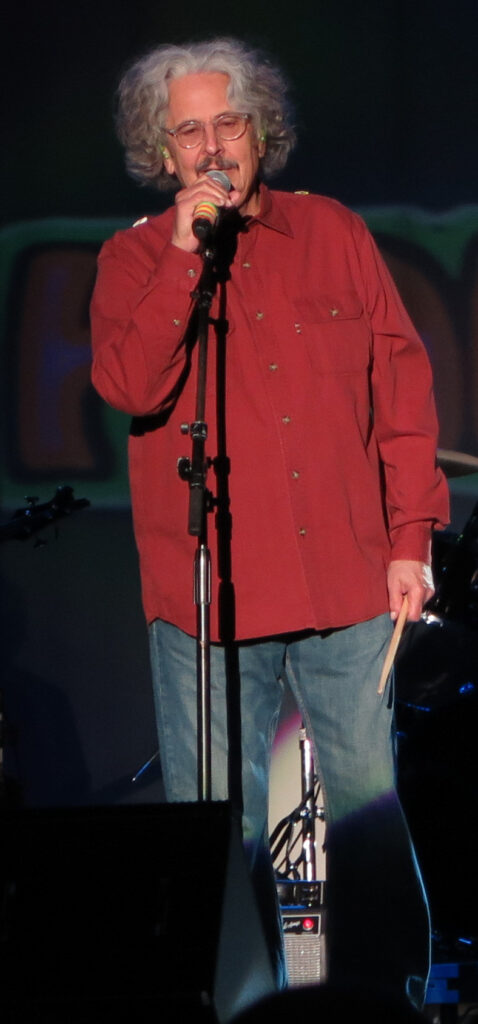
Mark Volman, a foundational figure in American pop and rock music, whose distinctive voice and ebullient personality graced the airwaves for decades, has passed away at the age of 78. Co-founder of the seminal 1960s hitmakers The Turtles and half of the innovative harmony duo Flo & Eddie, Volman’s career was a testament to his versatility, entrepreneurial spirit, and an unwavering commitment to the craft and business of music. His death, confirmed by representatives to Rolling Stone as due to a “brief, unexpected illness,” marks the end of an era for a musician who not only entertained millions but also profoundly influenced the landscape of artist rights.
Volman’s remarkable journey through the music industry was defined by a series of artistic evolutions, from the sun-drenched surf-rock of his early days to the psychedelic flourishes of The Turtles’ peak, and then into the avant-garde rock of Frank Zappa’s Mothers of Invention. Later, as Flo & Eddie, he became an in-demand session vocalist and a pioneering advocate for musicians’ intellectual property rights. Even while grappling with a diagnosis of Lewy Body Dementia, which he publicly disclosed in 2023, Volman continued to perform, embodying the resilience and joy that characterized his public persona and much of his music.
His passing, on September 5, leaves behind a legacy of unforgettable songs, a blueprint for artist empowerment, and a deep imprint on the hearts of fans and colleagues. This in-depth look explores the significant chapters of Volman’s life, charting his impact as a musician, innovator, and an enduring presence in the cultural tapestry, beginning with his final years and the genesis of his extraordinary musical path.

1. **Mark Volman’s Passing and Enduring Legacy**
Mark Volman died on September 5 in Nashville, Tennessee, at the age of 78, following what his representatives described as a “brief, unexpected illness.” The news of his passing brought an outpouring of tributes for the singer known for his exuberant stage presence and distinctive vocals. His lawyer and longtime friend, Evan Cohen, eulogized him on Facebook, stating, “Always funny, always upbeat, and a spirited and inventive performer, we will miss him greatly.”
Volman had been diagnosed with Lewy Body Dementia in 2020, a condition leading to a decline in cognitive ability, affecting reasoning, memory, and movement. Despite this challenging diagnosis, he chose to keep performing on the annual “Happy Together” tours. He publicly revealed his battle with the illness only in 2023, coinciding with the promotion of his memoir, “Happy Forever: My Musical Adventures with the Turtles, Frank Zappa, T. Rex, Flo & Eddie, and More.”
His public acceptance of his fate, as he told People magazine, reflected his steadfast spirit: “I got hit by the knowledge that this was going to create a whole new part of my life. And I said, ‘OK, whatever’s going to happen will happen, but I’ll go as far as I can.’” This determination to continue performing through increasingly debilitating symptoms, which included hallucinations, tremors, and struggles with concentration, underscored his commitment to his music and his fans until the very end.
Volman’s significant other, Emily Volman, captured his essence in an Instagram post, describing him as a “magical man” who was “goofy and happy and funny and smart and generous and kind and talented and gentle and creative and thoughtful and hardworking and tough and unique.” This sentiment echoes the widespread affection for Volman, whose impact transcended his musical achievements to touch many lives with his positivity and humor. His enduring contribution, particularly with the song “Happy Together,” which “changed our entire future forever,” as Volman once noted, ensures his voice will resonate for generations.

2. **The Turtles: Genesis and Early Success**
Mark Volman’s musical journey began in Los Angeles, where he was born on April 19, 1947, and grew up in the musical household of Westchester. Even in his youth, relatives noted his exuberant personality, with his aunt Ann Becker recalling in “Happy Forever” her mother saying, “‘That boy is so smart — he shouldn’t be so silly.’” This blend of intelligence and irreverence would become a hallmark of Volman’s career.
His formative musical partnership with Howard Kaylan began in high school, where they met in choir, both singing tenor. Volman, initially a saxophonist, joined Kaylan in the surf-rock combo the Crossfires. The band, which had two singles to its name, signed with the fledgling White Whale Records in 1965. This marked a pivotal moment, as the group transitioned from surf-rock to folk-rock, with Volman and Kaylan moving to lead vocals.
The label suggested a new name, leading to the adoption of The Turtles, a choice that proved serendipitous. Taking inspiration from The Byrds’ successful cover of Bob Dylan’s “Mr. Tambourine Man,” The Turtles released their revved-up version of Dylan’s “It Ain’t Me Babe.” This track skillfully tapped into the prevailing zeitgeist, rapidly ascending into the Billboard Top 10 in the summer of 1965.
Volman vividly recalled the swiftness of their early success, stating, “I graduated from high school in February 1965 and was on tour in June with a Top 10 record and on the Dick Clark Show.” This immediate breakthrough launched the young musicians into the national spotlight, setting the stage for a remarkable career that would see them achieve even greater heights with their subsequent releases.

3. **“Happy Together”: A Defining Hit**
Despite their early success, The Turtles’ initial hot streak cooled briefly after a couple of spirited sequels like “Let Me Be” and “You Baby” in 1966. A series of subsequent singles struggled to chart, signaling a need for a resurgence. That revival came in the form of “Happy Together,” a song famously rejected by numerous pop groups before it found its home with The Turtles.
The song’s fortunes were dramatically transformed, thanks in large part to a sterling arrangement masterminded by their new bassist, Chip Douglas. His creative input elevated the track, imbuing it with the infectious, uplifting quality that would make it an instant classic. The song’s iconic “ba-ba-baaaahh’s” became an indelible part of pop culture, embodying the lovestruck flower-power aesthetic of the era.
“Happy Together” soared to the top of the charts, taking the No. 1 spot on the Billboard Hot 100 in spring 1967 and holding it for three weeks. It quickly became one of the defining standards of its era, permeating popular culture through its frequent appearances in commercials and films. Its omnipresence solidified its place as a generational anthem, resonating far beyond its initial release.
Volman often reflected on the profound impact of this single, sharing, “That one song changed our entire future forever.” He noted the constant stories he heard from people about the song’s meaning to them, including its frequent play at weddings. “We were very fortunate to be part of a song that has such staying power. That song has really become part of the American life of so many people,” he acknowledged, underscoring the track’s deep cultural penetration and timeless appeal.

4. **Evolving Sound of The Turtles**
Following the monumental success of “Happy Together,” The Turtles continued to navigate the dynamic musical landscape of the late 1960s, a period marked by rapid genre evolution. Their sweet spot in the second half of the decade was characterized by a polished Southern Californian folk-rock sound, expertly refined with studio savvy. This approach yielded further hits like “She’d Rather Be With Me,” which peaked at Number Three on the Hot 100, and “Elenore,” alongside other tracks such as “You Know What I Mean” and “She’s My Girl.”
While these songs appealed to mainstream listeners, even earning them an invitation to play the White House for Richard Nixon’s daughter Tricia in 1970, Volman and Kaylan also winked at hipper audiences. They consistently pushed the band to make “hip music” even as their label, White Whale, pressed for more commercial material. This artistic tension often gave the sense that The Turtles were “too smart for the room,” reflecting their desire to explore beyond pure pop.
Their commitment to artistic experimentation was most notably evident in 1968’s “The Turtles Present the Battle of the Bands,” a concept album constructed with each track featuring the group adopting a different guise and musical style. This innovative approach allowed them to showcase their diverse talents and challenge conventional expectations, a stark contrast to the label’s commercial demands. Volman and Kaylan also arranged for the remaining three members of the band to share songwriting credits on this album, demonstrating their solidarity.
For their final album, “Turtle Soup,” released in 1969, The Turtles took another bold step by hiring Ray Davies of The Kinks as their producer. This was Davies’ first production outside his main band, a choice that further underscored The Turtles’ ambition to create sophisticated, well-crafted music. Volman believed that, musically, songs like “She’s My Girl,” “You Know What I Mean,” “Me About You,” and “The Story of Rock & Roll” were even better records than “Happy Together,” highlighting their deep pride in their diverse artistic output.
Read more about: The Enduring Chapters of a Child Star: Corey Feldman’s Complex Hollywood Journey, From Teen Icon to Controversial Advocate

5. **The Turbulent Relationship with White Whale Records**
As the biggest act on the relatively small White Whale Records, The Turtles found themselves under constant pressure from the label to record more commercially oriented material. This dynamic created significant tension, as Mark Volman and Howard Kaylan were intent on pushing the band toward more artistically ambitious and “hip” music. Their artistic vision frequently clashed with the label’s commercial imperatives, leading to an increasingly strained relationship.
When White Whale suggested firing the rest of The Turtles to focus solely on Volman and Kaylan, the duo staunchly resisted. Instead, they orchestrated a deal for the remaining three members to share songwriting credits on “The Turtles Present the Battle of the Bands,” the first album released after the monumental success of “Happy Together.” This decision highlighted Volman and Kaylan’s loyalty to their bandmates and their commitment to shared creative and financial success.
By 1970, the tensions between The Turtles and White Whale had escalated to an irreconcilable point, ultimately leading to the group’s disbandment. The fallout from this acrimonious split had severe repercussions for Volman and Kaylan. White Whale exercised a restrictive clause in the band’s recording contract that explicitly prevented members from performing “individually or collectively.”
This contractual constraint effectively barred Volman and Kaylan from continuing their musical careers either as a group or under their own names. This legal obstacle necessitated a complete reinvention for the duo, forcing them to devise a new identity and pathway forward. The experience instilled in them a sharp business acumen and a vigilant eye on artist rights, lessons that would shape their future endeavors.

6. **Birth of Flo & Eddie and Zappa Connection**
The contractual restraints imposed by White Whale Records after The Turtles’ disbandment in 1970 presented Volman and Kaylan with a unique challenge: they could no longer perform under their own names or as The Turtles. This legal bind compelled them to devise an entirely new moniker and artistic identity. They chose “The Phlorescent Leech & Eddie,” a name that was swiftly shortened to Flo & Eddie, with Volman becoming “Flo” (short for “The Phlorescent Leech”) and Kaylan taking the name “Eddie.”
This reinvention, born out of adversity, proved to be a pivotal moment in their careers. Not long after the implosion of The Turtles, an unexpected opportunity arose. Frank Zappa, a figure renowned for his avant-garde and unconventional approach to music, invited the duo to join his Mothers of Invention ensemble. This collaboration marked a significant departure from their pop-rock roots and opened new artistic horizons.
Volman described this period as a profound learning experience, noting that Zappa “opened the door for us to explore and be involved with a lot of really grown up music.” He elaborated, “I say ‘grown up’ because it had guitar changes and singing parts that we created for Frank. We couldn’t create those for any other place.” Zappa, Volman added, “really turned us loose. He turned us loose to sing what we could bring to the different songs.”
Their tenure with Zappa’s Mothers of Invention proved to be eventful, including a concert in Montreux, Switzerland, that famously ended with the venue engulfed in fire, an event immortalized in Deep Purple’s song “Smoke on the Water.” This association not only gave Flo & Eddie a significant boost in profile but also allowed them to hone their comedic shtick and musical versatility, laying the groundwork for an enduring and multifaceted career that extended far beyond their initial pop fame.
7. **Flo & Eddie: Session Legends and Harmonic Support**
Having reinvented themselves as Flo & Eddie and gained exposure through their work with Frank Zappa, Mark Volman and Howard Kaylan quickly carved out a niche as in-demand session vocalists and providers of exquisite harmonic support. Their ability to deliver intricate and distinctive backing vocals made them highly sought after by some of the biggest names in music across various genres. This period showcased their immense versatility and collaborative spirit.
One of their most notable contributions was to T. Rex’s landmark glam album “Electric Warrior,” and particularly on the iconic track “Bang a Gong (Get It On).” Their harmonies added a crucial layer of texture and flair to Marc Bolan’s proto-glam rock, contributing significantly to the album’s enduring appeal and status as a classic. They also toured with Alice Cooper, lending their vocal talents to his theatrical rock performances during the early 1970s.
Perhaps one of their most widely recognized session contributions came with Bruce Springsteen’s “Hungry Heart.” When Springsteen was looking for Beach Boys-like harmonies for what would become his first Top 10 hit, Flo & Eddie were the perfect choice. Their signature vocal blend provided the distinct backing that perfectly complemented the song’s catchy melody, further solidifying their reputation as go-to harmony specialists.
Their extensive session work extended to an impressive roster of artists throughout the 1970s and 1980s. This included collaborations with legendary figures like John Lennon and Yoko Ono, as well as providing support for Blondie, Stephen Stills, David Cassidy, Ray Manzarek (of The Doors), and Roger McGuinn (of The Byrds). These diverse engagements underscored their ability to adapt their vocal style to different musical contexts, making them a cornerstone of many memorable recordings of the era and cementing their status as true session legends.

8. **Flo & Eddie: Independent Artistic Ventures and Comedic Shtick**
Beyond their revered role as session vocalists, Flo & Eddie, the inventive duo of Mark Volman and Howard Kaylan, cultivated a distinctive niche through their own independent artistic endeavors. After their formative period with Frank Zappa’s Mothers of Invention, which Volman described as opening the door for them “to explore and be involved with a lot of really grown up music,” they embraced a multifaceted approach to their career, blending musicality with a unique brand of humor.
Beginning with their 1972 album, “The Phlorescent Leech & Eddie,” the duo embarked on a series of increasingly facetious recordings throughout the 1970s. These albums showcased their harmonies and satirical wit, allowing them to fully develop their comedic persona alongside their musical talents. Their stage presence became characterized by this blend of intricate vocal arrangements and lighthearted, often irreverent, humor, solidifying their reputation as versatile entertainers.
Their artistic contributions extended beyond studio albums and live performances. In the 1980s, Volman and Kaylan began composing music more regularly for film and television, adapting their talents to diverse projects. Notably, they lent their creative touch to children’s programming, contributing original music to animated television shows such as specials focusing on “Strawberry Shortcake” and “The Care Bears” series, further demonstrating their adaptability across various media platforms.
While their own recording output as Flo & Eddie waned by the mid-1980s, their comedic and musical partnership continued to thrive. They transitioned their act to radio and continued to tour extensively, particularly once the legal impediments regarding their former band’s name were resolved. This period underscored their capacity to maintain a relevant and engaging presence in the entertainment industry through diverse avenues.
9. **Reacquiring Rights and The Turtles’ Revival**
The acrimonious split with White Whale Records in 1970 left Mark Volman and Howard Kaylan in a difficult position, legally barred from performing as The Turtles or even under their own names. This contractual constraint necessitated their reinvention as Flo & Eddie and their subsequent work with Frank Zappa, a period of creative and professional rebuilding. However, the underlying desire to regain control of their artistic legacy, particularly The Turtles’ catalog and name, remained a long-term objective.
The arduous process of reclaiming their rights began in 1974. With White Whale Records’ assets being put up for auction, Volman and Kaylan seized the opportunity to acquire the master recordings of The Turtles. This was a crucial first step in their strategic effort to manage and benefit from their own musical output, demonstrating an early and astute business acumen that set them apart from many of their peers in the “oldies” circuit.
A decade later, in the mid-1980s, Volman and Kaylan finally succeeded in winning back the rights to perform under The Turtles’ name. This hard-won victory allowed them to once again tour as the iconic group, albeit often billed as “The Turtles… featuring Flo & Eddie” to highlight their dual identity. This re-establishment of The Turtles name reignited their presence on the oldies circuit, where they became a perennial favorite.
The duo maintained a successful and busy touring schedule, performing their hits and comedic act well into the 2010s. Howard Kaylan, however, retired from the road in 2018 due to health challenges. Undeterred, Volman continued performing as The Turtles, with Ron Dante stepping in for Kaylan on the annual “Happy Together” package tours. This commitment ensured that the music and spirit of The Turtles continued to reach audiences across generations, a testament to Volman’s unwavering dedication.

10. **The Groundbreaking De La Soul Lawsuit and Sampling Precedent**
Mark Volman and Howard Kaylan’s keen business acumen, forged in the crucible of their early contractual disputes, extended significantly into the realm of intellectual property rights. A pivotal moment in this aspect of their career occurred when they confronted the emerging practice of sampling in hip-hop. In 1989, the acclaimed hip-hop trio De La Soul released their debut album, “3 Feet High and Rising,” which notably featured an uncleared sample from The Turtles’ 1969 track “You Showed Me” on their song “Transmitting Live From Mars.”
Recognizing the unauthorized use of their work, Volman and Kaylan initiated a landmark lawsuit against De La Soul. They sought a substantial $2.5 million in exemplary and punitive damages, bringing the issue of sample clearance forcefully into the legal spotlight. The dispute, which many in the hip-hop community critically viewed as setting a potentially burdensome precedent, was ultimately settled out of court.
While the specific terms of the settlement were not publicly disclosed, reports indicated that Volman and Kaylan were awarded a significant sum, reportedly $1.7 million in damages. This outcome sent shockwaves through the music industry, particularly in hip-hop, where sampling had been a foundational creative element, often used without formal clearance processes.
The lawsuit and its resolution effectively marked a turning point, ushering in a new era for hip-hop production. It firmly established the necessity of clearing samples and paying royalties for their use, thereby ending what was widely considered the “golden age of sampling” where unauthorized use was more common. This legal action solidified Volman and Kaylan’s reputation not only as musicians but also as staunch advocates for artists’ rights, shaping the business practices of an entire genre.
11. **The Battle for Pre-1972 Royalties: The Sirius XM Lawsuit**
Building upon their previous legal successes in advocating for artists’ rights, Volman and Kaylan embarked on another significant legal battle in 2013, addressing a long-standing ambiguity in copyright law. This time, their target was Sirius XM, the satellite radio company, which they accused of failing to pay sound recording royalties for songs recorded before 1972 in California, New York, and Florida. The issue stemmed from the fact that federal copyright protection for sound recordings only began in 1972, leaving pre-1972 recordings under varying state laws and often unprotected or under-compensated.
Flo & Eddie filed a class-action lawsuit, asserting that these legacy recordings deserved compensation for their broadcast. The initial rulings were mixed; a California judge sided with the duo in 2014, acknowledging the artists’ right to royalties, while a Florida judge ruled in favor of Sirius XM in 2015. This divergence highlighted the complex and inconsistent legal landscape surrounding older sound recordings across different states.
Despite the initial inconsistencies, the lawsuit generated significant momentum and a groundswell of similar cases brought by both major and independent labels. Eventually, a settlement was reached with Sirius XM in 2016, reportedly for $99 million with The Turtles alone. Although Sirius XM would later win subsequent legal appeals in Florida and California, the collective impact of these lawsuits was profound.
Crucially, these legal challenges helped pave the way for the bipartisan CLASSICS (Compensating Legacy Artists for their Songs, Service, and Important Contributions to Society) Act. This vital piece of legislation, a component of the 2019 Music Modernization Act, finally extended federal copyright protections to pre-1972 sound recordings. Volman and Kaylan’s persistent advocacy in this area played a direct role in securing financial recognition for countless legacy artists, cementing their legacy as pioneers in copyright reform.

12. **A Return to Academia: From Student to Esteemed Professor**
In a testament to his intellectual curiosity and adaptability, Mark Volman embarked on an unexpected yet impactful journey into academia in his mid-forties. Following his divorce in 1992, at the age of 45, Volman made the remarkable decision to return to college, a path inspired in part by accompanying his older daughter on a school visit. This marked a profound shift from the performance-centric world he had inhabited for decades.
Volman enrolled at Loyola Marymount University in Los Angeles, pursuing a bachelor’s degree. His dedication to his studies was evident, as he graduated in 1997 with several honors, demonstrating that his sharp intelligence, noted by relatives even in his youth, extended well beyond his musical prowess. This academic achievement was not an endpoint but a stepping stone in his educational pursuits.
Furthering his commitment to higher education, Volman went on to earn a Master of Fine Arts degree in 1999 from Loyola Marymount, with an emphasis on screenwriting. This period of intense study not only broadened his intellectual horizons but also equipped him with new skills and perspectives that would soon find an outlet in a burgeoning new career path: teaching.
His transition into education was swift and impactful. Volman began teaching college-level music business courses, a natural evolution given his extensive real-world experience across all facets of the music industry. His unique background as a chart-topping artist, session musician, and business advocate positioned him perfectly to impart practical knowledge and insights to aspiring music professionals, bridging the gap between theory and practice.

13. **Volman the Educator: Imparting Wisdom at Belmont University**
Mark Volman’s journey in academia found a long-term home at Belmont University in Nashville, Tennessee, a renowned institution for its music and entertainment business programs. He eventually became an associate professor at the Mike Curb College of Entertainment & Music Business, where he shared his unparalleled industry experience with a new generation of students. His teaching philosophy was deeply rooted in reality, aiming to prepare students not just for success, but also for the inevitable challenges of a competitive industry.
Volman’s approach to education was far from conventional. He believed in experiential learning, often taking his students on tour with him as part of his classes. This unique opportunity provided them with invaluable firsthand experience in critical aspects of the music business, including tour management, stage management, audio engineering, and tour accounting. These immersive experiences offered practical insights that classroom lectures alone could not replicate.
His philosophy extended to demystifying the often-glamorized aspects of a music career. Speaking to the Nashville Scene about his decision to teach, Volman explained, “Successful artists are few and far between, and I wanted to attach an element of reality to things.” He stressed the importance of resilience, adding, “Failure is an option, a good option because it teaches you to pick yourself up. Just because you put out a record that doesn’t succeed, that doesn’t make it a bad record.”
Through his candid teachings and hands-on mentorship, Volman not only instructed but also inspired. He provided a balanced perspective that celebrated ambition while instilling a pragmatic understanding of the industry’s complexities. His tenure at Belmont University underscored his commitment to nurturing future talent and ensuring they were equipped with both the passion and the practical skills necessary for sustainable careers in music.
14. **An Enduring Spirit: Performance and Legacy Amidst Illness**
Mark Volman’s final years were characterized by a profound display of courage and an indomitable spirit, as he continued to embrace his musical passion despite a challenging diagnosis. In 2020, he was diagnosed with Lewy Body Dementia, a debilitating condition affecting cognitive ability, reasoning, memory, and movement. Despite the progressive nature of the illness, Volman made the remarkable decision to continue performing on the annual “Happy Together” tours, embodying a steadfast commitment to his art and his audience.
He publicly revealed his battle with Lewy Body Dementia in 2023, coinciding with the promotion of his memoir, “Happy Forever: My Musical Adventures with the Turtles, Frank Zappa, T. Rex, Flo & Eddie, and More.” In a reflective interview with People magazine, Volman articulated his acceptance and resilience: “I got hit by the knowledge that this was going to create a whole new part of my life. And I said, ‘OK, whatever’s going to happen will happen, but I’ll go as far as I can.’” This declaration underscored his determination to confront his illness head-on while continuing to engage with life and music.
His ability to perform through increasingly debilitating symptoms, including hallucinations, tremors, and difficulties with concentration, was a testament to his profound love for music and his desire to connect with fans. Emily Volman, his significant other, affectionately described him as a “magical man” who was “goofy and happy and funny and smart and generous and kind and talented and gentle and creative and thoughtful and hardworking and tough and unique,” sentiments that resonated deeply with those who knew him and his public persona.
Volman’s decision to continue touring and sharing his story, even as his health declined, showcased not just a performer’s dedication but a human spirit dedicated to finding joy and connection amidst adversity. His final performances became an extension of his memoir, a living narrative of perseverance and the enduring power of music to bring people together. The sentiment that “Happy Together” changed their future forever, as he often noted, extended to the profound impact of his later years.
Read more about: Beyond the Final Curtain: 14 Beloved Stars Whose Last Roles Left an Indelible Mark on Hollywood
Mark Volman’s legacy is thus multi-faceted: a voice that defined a generation, a creative partner whose versatility knew no bounds, a shrewd business advocate who shaped industry practices, and an inspiring educator who mentored future talents. His life, marked by exuberance, innovation, and an unwavering commitment to music and artist rights, will continue to resonate, reminding us of the enduring power of his artistic contributions and his truly happy spirit.” , “_words_section2”: “1840







